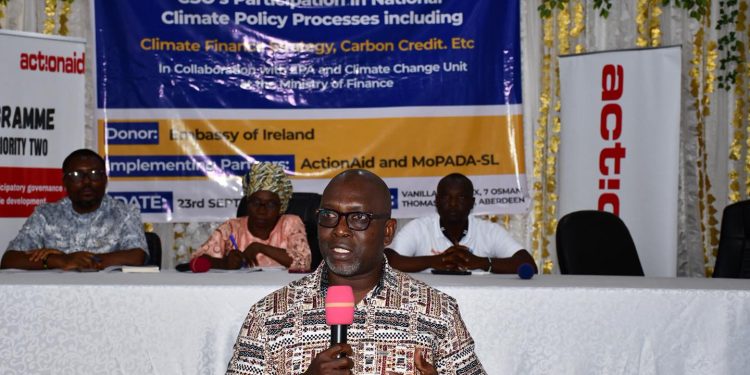By Hassan Osman Kargbo
ActionAid Sierra Leone, in collaboration with the Movement towards Peace and Development Agency Sierra Leone (MoPADA-SL) and with funding support from Ireland in Sierra Leone, has convened a national climate dialogue with Civil Society Organisations (CSOs) aimed at enhancing their role in shaping climate governance.
The dialogue, held in Freetown, brought together CSOs from across the country to strengthen their participation in national climate policy processes and broaden civic engagement in environmental governance. Discussions focused on Sierra Leone’s Climate Finance Strategy, carbon credits, and the country’s commitment to climate policy reforms.
ActionAid Sierra Leone Executive Director, Foday Bassie Swaray, described the initiative as both timely and necessary given Sierra Leone’s vulnerability to climate shocks. “We have all witnessed the devastating effects of climate change through mudslides and flooding in Freetown, while in Tonkolili District communities struggle to access clean drinking water,” he said. Swaray thanked the Government of Ireland for its support, noting that the ongoing Climate Finance Strategy, the Climate Act, and Sierra Leone’s Nationally Determined Contribution (NDC) 3.0 are critical policy areas where CSOs can play a vital role. He emphasized that the engagement would foster stronger collaboration between CSOs and government while boosting CSOs’ capacity to influence climate market policies.
Representing Ireland, Joseph J. Ellie, Senior Governance Advisor at the Embassy, reaffirmed his country’s commitment to climate action as a key development priority. “Our approach is rooted in delivering tangible change for the most vulnerable, acting in solidarity with government, communities, and CSOs to build resilience and adaptation capacity,” Ellie said. He added that Ireland remains proud to support climate-smart agriculture, renewable energy pilots, and inclusive community dialogues while also helping to establish long-term frameworks for climate finance.
Civil society voices at the dialogue underscored the urgency of stronger climate interventions. Mahawa Agatha Kamara, a CSO representative from Tonkolili District, raised serious concerns over the impact of illegal mining in her community. “The influx of foreigners has increased illegal mining and destroyed our land, making it hard for rural women to do agriculture,” she explained. Kamara welcomed ActionAid’s support in training community leaders to enforce by-laws against illegal mining but criticized what she described as the slow response of the Environment Protection Agency (EPA) in addressing the situation in Tonkolili.
On behalf of government, the Deputy Minister of Environment and Climate Change, Hon. Mima Yeama Sobba Stephens, underscored the need for collective action and effective leadership in addressing the climate crisis. “Climate change is about having clear roles, transparent systems, and strong leadership. Climate is not just an environmental issue—it is a health and development problem,” she said.
Adding her voice, Hon. Mariama Munia Zombo from Pujehun District called for unity across sectors and institutions to achieve Sierra Leone’s climate goals. She emphasized that climate action requires joint responsibility between government, CSOs, and local communities to ensure effective implementation.
The national climate dialogue is considered a crucial step toward equipping CSOs with the knowledge and capacity to demand accountability and promote community-driven resilience against climate-induced disasters. By creating space for CSOs and local voices, the dialogue strengthens Sierra Leone’s path toward sustainable climate governance and reinforces the importance of inclusive participation in achieving national and global climate targets.













